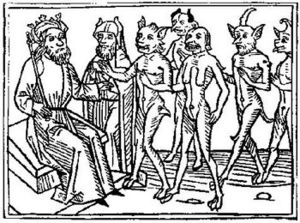Belial
Belial (Ibrani: בְּלִיַעַל) (juga Belhor, Baalial, Beliar, Beliall, Beliel, Beliya'al) adalah sebuah istilah yang muncul dalam Alkitab Ibrani. Kata tersebut kemudian menjadi personifikasi dari iblis[1] dalam teks-teks Yahudi dan Kristen.[2]

Rujukan sunting
- ^ See the reference to "Beliar" in The Ascension of Isaiah, at EarlyChristianWritings.com, specifically at 1:8-9, 2:4, 3:11-13, 4:2, 4:14-18, 5:1, 5:15.
- ^ Michael H. Floyd (2000). Minor Prophets: Volume 2, p 46. Nahum The eater of daughters. "In late biblical times beliya'al came to designate a mythic personification of evil, and Belial thus became the name of a satanic figure... Two considerations militate against this sort of reading, one historical and the other grammatical. First, the mythic personification of Belial appears to have been a rather late development, and there is no good reason to suppose that beliya'al had assumed this meaning by the time Nahum was composed. There is no evidence of a satanic figure named Belial in biblical or extrabiblical literature from earlier than the third century BCE (T. J. Lewis, "Belial," ABD 1 :655-56), and most scholars would date the final edition of .."
Daftar pustaka sunting
- S. L. MacGregor Mathers, A. Crowley, The Goetia: The Lesser Key of Solomon the King (1904). 1995 reprint: ISBN 0-87728-847-X.
- Metzger, Bruce M.; Coogan, Michael D., ed. (1993). The Oxford Companion to the Bible. Oxford, UK: Oxford University Press. ISBN 0-19-504645-5.